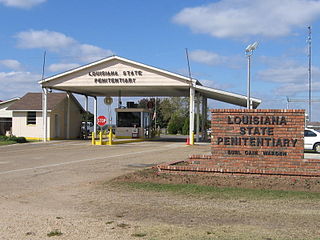Related Research Articles

In the United States, capital punishment is a legal penalty throughout the country at the federal level, in 27 states, and in American Samoa. It is also a legal penalty for some military offenses. Capital punishment has been abolished in 23 states and in the federal capital, Washington, D.C. It is usually applied for only the most serious crimes, such as aggravated murder. Although it is a legal penalty in 27 states, 20 states have the ability to execute death sentences, with the other seven, as well as the federal government, being subject to different types of moratoriums.

Capital punishment is a legal penalty in the U.S. state of Louisiana.
Capital punishment is a legal penalty in the U.S. state of Arkansas.

Capital punishment is a legal penalty in the U.S. state of Ohio, although all executions have been suspended indefinitely by Governor Mike DeWine until a replacement for lethal injection is chosen by the Ohio General Assembly. The last execution in the state was in July 2018, when Robert J. Van Hook was executed via lethal injection for murder.
Capital punishment is a legal penalty in the U.S. state of Utah.
The U.S. state of Washington enforced capital punishment until the state's capital punishment statute was declared null and void and abolished in practice by a state Supreme Court ruling on October 11, 2018. The court ruled that it was unconstitutional as applied due to racial bias however it did not render the wider institution of capital punishment unconstitutional and rather required the statute to be amended to eliminate racial biases. From 1904 to 2010, 78 people were executed by the state; the last was Cal Coburn Brown on September 10, 2010. In April 2023, Governor Jay Inslee signed SB5087 which formally abolished capital punishment in Washington State and removed provisions for capital punishment from state law.

Capital punishment was abolished via the legislative process on May 2, 2013, in the U.S. state of Maryland.
Capital punishment is a legal penalty in the U.S. state of Nebraska. In 2015, the state legislature voted to repeal the death penalty, overriding governor Pete Ricketts' veto. However, a petition drive secured enough signatures to suspend the repeal until a public vote. In the November 2016 general election, voters rejected the repeal measure, preserving capital punishment in the state. Nebraska currently has 12 inmates on death row.
Gregg v. Georgia, Proffitt v. Florida, Jurek v. Texas, Woodson v. North Carolina, and Roberts v. Louisiana, 428 U.S. 153 (1976), is a landmark decision of the U.S. Supreme Court. It reaffirmed the Court's acceptance of the use of the death penalty in the United States, upholding, in particular, the death sentence imposed on Troy Leon Gregg. The set of cases is referred to by a leading scholar as the July 2 Cases, and elsewhere referred to by the lead case Gregg. The court set forth the two main features that capital sentencing procedures must employ in order to comply with the Eighth Amendment ban on "cruel and unusual punishments". The decision essentially ended the de facto moratorium on the death penalty imposed by the Court in its 1972 decision in Furman v. Georgia 408 U.S. 238 (1972). Justice Brennan dissent famously argued that "The calculated killing of a human being by the State involves, by its very nature, a denial of the executed person's humanity... An executed person has indeed 'lost the right to have rights."
Capital punishment was abolished in 2019 in New Hampshire for persons convicted of capital murder. It remains a legal penalty for crimes committed prior to May 30, 2019.
Coker v. Georgia, 433 U.S. 584 (1977), held that the death penalty for rape of an adult woman was grossly disproportionate and excessive punishment, and therefore unconstitutional under the Eighth Amendment to the U.S. Constitution. A few states continued to have child rape statutes that authorized the death penalty. In Kennedy v. Louisiana (2008), the court expanded Coker, ruling that the death penalty is unconstitutional in all cases that do not involve intentional homicide or crimes against the State.

Capital punishment in Alabama is a legal penalty. Alabama has the highest per capita capital sentencing rate in the United States. In some years, its courts impose more death sentences than Texas, a state that has a population five times as large. However, Texas has a higher rate of executions both in absolute terms and per capita.
Capital punishment is a legal penalty in the U.S. state of South Dakota.

Capital punishment is a legal penalty in the U.S. state of Florida.

Capital punishment is a legal penalty in the U.S. state of Mississippi.
Capital punishment is currently a legal penalty in the U.S. state of Kansas, although it has not been used since 1965.
Capital punishment is a legal penalty in the U.S. state of South Carolina. Between 1718 and 2021, more than 680 people have been executed in South Carolina. After the nationwide capital punishment ban was overturned in 1976, South Carolina has executed 43 people.
Capital punishment is a legal punishment in Tennessee.
Capital punishment in Missouri first used in 1810 is a legal penalty in the U.S. state of Missouri.
Capital punishment is a legal penalty in the U.S. state of Kentucky.
References
- 1 2 "Georgia". Death Penalty Information Center. Retrieved June 21, 2019.
- ↑ Inmate Statistical Profile - Under Death Sentence (PDF). Atlanta: Georgia Department of Corrections. 2023. Retrieved April 3, 2023.
- ↑ A History of the Death Penalty in Georgia (PDF). Atlanta: Georgia Department of Corrections. 2014. pp. 2–3. Archived from the original (PDF) on September 12, 2014.
- ↑ "§ 17-10-31 - Requirement of jury finding of aggravating circumstance and recommendation of death penalty prior to imposition; arguments of counsel during sentencing phase; jury instructions; actions of judge in event of failure to reach unanimous verdict". law.justia.com. Retrieved December 13, 2016.
- ↑ "ARTICLE IV. CONSTITUTIONAL BOARDS AND COMMISSIONS". law.justia.com. Retrieved December 13, 2016.
- ↑ "§ 17-10-38 - Death sentences generally". law.justia.com. Retrieved December 13, 2016.
- ↑ Georgia Code § 17-10-30